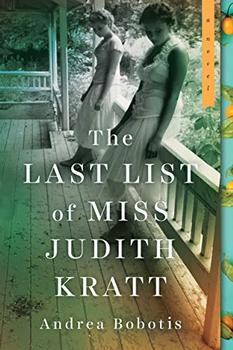Book Club Discussion Questions
In a book club? Subscribe to our Book Club Newsletter!
For supplemental discussion material see our Beyond the Book article, Books about the History of Race in America and our BookBrowse Review of The Last List of Miss Judith Kratt.
Please be aware that this discussion guide will contain spoilers!
Topics for Discussion
- How would you describe Judith? What are her virtues? What are her flaws?
- Why does Rosemarie's return compel Judith to begin writing her inventory? In what other ways does Rosemarie disrupt Judith's life?
- How would you characterize Judith and Olva's relationship? Is it one of equals? How does their relationship change throughout the novel?
- In the first chapter, Judith compares the concept of memory to a letter opener made of cut glass: "held to the window, it produced a different color for each of us." How do Judith's memories shape the way she tells her family's story?
- Olva has her own take on memory. She says to Judith, "Memory and history are bound up with one another. Where does one end and the other begin?" What do you think Olva means by this? How might the relationship be-tween memory and history be an especially charged one in the South?
- Quincy describes siblinghood to Judith in this way: "You and Rosemarie are the mold, and I'm the gelatin that never set." Judith weighs in, too: "This was the way of siblings, how my existence, my very selfhood, grew partly from what Quincy was not. And from what Rosemarie was not." How has birth order influenced the experiences of the Kratt children and the choices they've made? Do you think your life has been affected by the decisions and actions of your siblings? If you are an only child, do you think you would be a different person if you had had siblings?
- This novel teems with objects. Judith records items in her inventory, but other inventories materialize, too, such as the merchandise in Daddy Kratt's department store, the gifts left for Rosemarie, and the collection of unfamiliar belongings in Olva's bedroom. What additional inventories can you find in the book? Why does Judith organize life into lists?
- Which object in the book do you believe is most significant and why? In your own life, do you have an object that you value above others?
- What do you think Judith covets most in her life? Is it a thing?
- Daddy Kratt and his associates pursue Charlie in the book's 1929 timeline. The Bramlett family searches for Marcus in the 1989 timeline. How are these two pursuits related? How do the two men's circumstances impact their relation-ships with their families?
- This novel explores the power of ownership. Olva says to Judith and Rosemarie, "Do you own your own life? If you have never had to ask that question, you are fortunate indeed." What do you think she means by this? How might questions about ownership be especially critical to ask in the context of the South's history and legacy of slavery and racial injustice?
- When Judith begins her inventory, what is her purpose? How has that purpose changed by the end of the novel?
- Is Daddy Kratt a villain? What about Jolly Bramlett and her son, Rick? What do these characters struggle with?
- What do you make of Olva's decision to sell the Kratt house and most of the heirlooms within it? Why does the possibility of a Kratt heir— Quincy and Dovey's potential child— not faze her?
- Has the relationship between Judith and Amaryllis shifted by the end of the book? If so, how, and which objects play a role in this shift?
- Why does Rosemarie leave Bound for a second time in her life?
- Why does this novel end with a letter from Olva to Amaryllis?
Further Projects
- Judith provides a list of novels containing spinsters like herself. She includes Jane Austen's Emma, Charles Dickens's Great Expectations, Henry James's The Bostonians, George Gissing's The Odd Women, and Edith Wharton's Bunner Sisters. Read one or more of these novels. Is Judith similar to those spinsters? Is her commentary accurate: "It is true some of these fictional heroines have challenging personali-ties, but defects of character are often an outcome of circumstances, are they not?"
- The author reveals in her Q&A that this novel began as a retelling of a story from her family's history. Is there a story from your family's history that is intriguing? An heirloom that has a tale to tell? Start with writing a paragraph. Then write another paragraph. Then another. That's how a book begins!
Unless otherwise stated, this discussion guide is reprinted with the permission of Sourcebooks.
Any page references refer to a USA edition of the book, usually the trade paperback version, and may vary in other editions.
